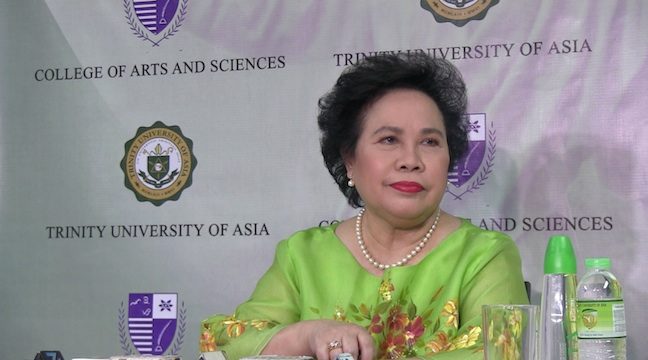SUMMARY
This is AI generated summarization, which may have errors. For context, always refer to the full article.

MANILA, Philippines – Senator Miriam Defensor Santiago on Monday, November 24, warned of opportunities for corruption by the executive branch if the proposed national budget for 2015 is passed with its “broad” definition of “savings.”
“The 2015 budget invents its own definition of savings, which provides that savings can be declared at any time for whatever might be considered ‘justifiable reasons,'” she said in a privilige speech.
“As a humble student of constitutional law, allow me to observe that the new definition is unconstitutional for being over-broad and for being vague,” Santiago added.
She echoed proposals made by Senate finance committee chairman Senator Francis Escudero to amend the definition of “savings” that Malacañang pushed for and which the House of Representatives adopted in the proposed P2.606 trillion budget for next week.
The senators contend that the redefinition of savings adopted by the lower chamber takes away Congress’ power of the purse.
Santiago wants to remove the phrase “at any time” to retain the original definition of savings. Under its controversial Disbursement Acceleration Program (DAP). Malacañang previously declared savings before the end of a fiscal year and moved funds from one agency to another without getting Congress’ approval.
The Supreme Court last July declared the DAP as partially unconstitutional. Among the schemes considered illegal was the movement of “unobligated funds” and “unreleased appropriations” to “savings,” which was subsequently used to finance other Malacañang priority projects.
The High Court said the movements did not comply with the “statutofy definition of savings” in the 2014 budget law. Thus, the new definitions that Malacañang pushed for in the 2015 budget bill. (READ: Abad: Redefined savings in 2015 budget ‘cures’ SC DAP ruling)
Santiago explained that the “broad” and “lax” definition of savings allows the President to “still transfer an appropriation from one agency to another” and may do this “at any time” without waiting for the end of the fiscal year or for Congress approval.
This, she said, is a “dangerous minefield leading to corruption.”
Unreleased appropriations cannot be declared savings
In his sponsorship speech on the 2015 budget bill last week, Escudero said reviewing the definition of savings is “foremost” in his agenda.
Escudero noted that the House of Representatives defined savings as “portions or balances of any programmed appropriations in the GAA (General Appropriations Act) which have not been released or obligated due to four instances.”
The senator proposed the Senate version to limit savings only to “portions or balances of any released appropriations in the GAA which have not been obligated.” It means the unreleased funds, Escudero said, will have to go back to the treasury and Congress will later decide how to use the funds.
The House version also allows the declaration of savings from the “non-commencement of projects…within the first semester of the year.” Escudero said the Senate version will only allow this at the end of the validity of the fund, which is the end of the fiscal year.
Escudero also said savings may not be used to fund new projects that were not identified by Congress in the budget bill.
Escudero also noted how the House of Representatives amended provisions to declare that “savings” from lump sum funds will be made “available to all 3 branches of the government including Constitutional Offices.”
This cures the Supreme Court ruling on DAP which declared illegal the “cross-border transfers of savings of the executive department to offices outside the executive department.”
Escudero said the Senate will delete this.
P37 billion pork barrel?
Santiago was also suspicious about certain the lump sum funds amounting to P37.3 billion in the 2015 budget. She suspected they are pork barrel, with the proposed 2015 budget perceived to be an election budget.
“Let me raise a big question about the 2015 budget. Last summer, why were representatives asked to submit lists of projects they endorsed for their districts? I understand that the form distributed did not bear any letterhead,” Santiago said.
She directed her attention to projects worth P37.3 billion in the Department of Public Works and Highways, Department of Health, Department of Social Works and Development, Department of Labor and Employment, and the Commission on Higher Education.
The presidential lump sum is even bigger, amounting to over P500 billion for 2015 alone, she said.
She also wants to restrict the use of savings from the Special Purpose Funds, especially the Miscellaneous Personnel Benefits Fund (MPBF) and the Pension and Gratuity Fund (PGF).
“The DBM might have bloated the budget for the MPBF and the PGF with the intention of using the ‘fat’ as a source for additional discretionary spending,” she said. – Rappler.com
Add a comment
How does this make you feel?
There are no comments yet. Add your comment to start the conversation.